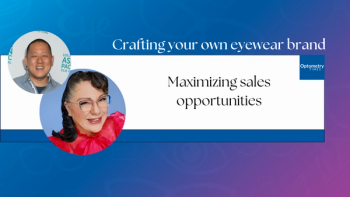
The new normal: Marketing eyewear in tough times
The retail optical industry was down 2.5% in 2009, according to industry data. The silver lining, however, is that compared with other industries, those numbers aren't so bad.
That's the read from Arthur De Gennaro, president of Arthur De Gennaro & Associates LLC, a Lexington, SC-based ophthalmic practice management firm that specializes in optical dispensary issues.
Although the percentage could be much higher, given the recessionary climate it is relatively low for a couple of reasons, according to De Gennaro. One, there was "an anomaly" earlier in the spring of this year, he said.
Second, he said many patients don't go to the eye doctor for routine care. Many go for regular medical care and don't tend to delay those visits, thereby helping to stabilize the industry numbers.
"Overall, the number of people affected in the optical world is not as high as you might imagine, given what's happening in other sectors," said De Gennaro, who spent 14 years as a chain store executive in the optical dispensing world. "The ophthalmology world fared better in the recession than nearly everybody else. The only exception to that is practices that did a lot of LASIK. They were down-really hard-40% or more."
In agreement is Donna A. Suter, president of Suter Consulting Group, of Chattanooga, TN, who has been consulting for eye-care professionals [ECPs] for the past 20 years. She added that ECPs still have been affected generally by the downturn in the economy.
"However, health care is very inflation-proof," Suter said. "Many people have health-care funds available for these types of purchases that are not impacted. Pre-tax-dollar health spending plans cover cost of high-end eyewear. The general economic climate isn't an OMG worry for the eye-care industry.
"However, any time there is a shrinkage in the budget, people start evaluating choices. My income may not change but I'm re-evaluating," she continued. "The optician must be very conscious of reselling and reconfirming choices their customers may have made last time they were there. Explain benefits to the customer. Re-educate about what is smart about this eyewear. We're establishing a new baseline of what is normal."
What is the new normal?
De Gennaro concurs with the "new normal." Although sales did not drop as much as anticipated, he said that everyone prepared as if it would. Many of his clients devised new ideas to market their businesses better. A recession-or the threat of one-can force people to think more creatively about cost-saving measures.
De Gennaro said one of his clients initiated a "Cash-for-Clunkers" sale, capitalizing on the concept introduced in the automotive industry. If customers brought in a pair of glasses to this particular ophthalmology practice, the glasses were donated to the local Lions Club. Customers then drew a folded piece of paper from a fishbowl; each paper contained a dollar amount that translated to a discount on their next pair of glasses.
Newsletter
Want more insights like this? Subscribe to Optometry Times and get clinical pearls and practice tips delivered straight to your inbox.













































